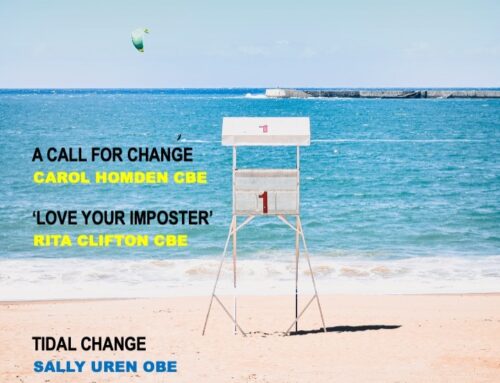Together against COVID-19: The primacy of partnership in the global fight against the coronavirus pandemic

One of the most important lessons emerging from the early responses to the coronavirus pandemic is the urgent need to work collaboratively across industries and sectors – to use the full force of our distinctive capabilities to tackle this global crisis together. Collaboration – especially through public-private partnerships – is key to ensuring a timely, effective, equitable, and sustainable response.
The coronavirus pandemic brings into stark relief the fragility of health systems around the world. Even countries with the most sophisticated health infrastructure have been paralyzed by this crisis. And while the impact of COVID-19 infections has been widespread – affecting individuals, families and communities in every region of the globe – the health and economic burdens continue to fall disproportionately on vulnerable populations.
During a recent “fireside chat” with Laurie Garrett, Pulitzer-prize winning journalist and global health expert, we talked about the fact that COVID-19 did not cause inequities, but has brought to light the flawed health systems that result in disparities in access. “Even if we had the magic pill tomorrow, the ‘we’ would be a very small portion of the planet,” Laurie commented.1https://rabinmartin1.webex.com/recordingservice/sites/rabinmartin1/recording/7751eab1b5954d1083627a17cac7c65d
As with any “problem without a passport,” no actor can tackle a crisis of this magnitude singlehandedly. These health threats transcend borders: no nation is immune, nor can any nation address the pandemic on its own. An unprecedented “all hands on deck” approach is vital to combat the virus and mitigate its damage. As Kenneth C. Frazier, Chairman & CEO, Merck & Co., Inc., has said: “Until all of us are safe, none of us are safe.”2https://www.cnbc.com/2020/05/26/merck-ceo-issues-warning-on-coronavirus-until-all-of-us-are-safe-none-of-us-are-safe.html
The speed with which COVID-19 infections have spread globally has brought a sense of urgency to creating new public-private partnerships to fight the pandemic with new treatments and vaccines. Leveraging diverse expertise and technical capabilities has been essential to accelerate immediate action and – hopefully — lay the foundation for long-term change to strengthen healthcare systems.
As scientists and clinicians work tirelessly to speed the development of safe and effective vaccines and treatments, health care providers are dedicating themselves to saving the lives of those infected. And as policymakers debate legislation to maintain the safety of their constituents, essential service employees are working around the clock to ensure shelves remain stocked, packages get delivered and streets are cleaned. We are seeing a strong mobilization of actors across sectors and extraordinary cooperation where everyone is doing his or her part – both on the frontlines and behind the scenes, individually and collectively. European Commission President Ursula von der Leyen captures this spirit in her remark that “This is the time for cooperation. This is the time for science and solidarity. This is the time for all humanity to rally around a common cause. And you can count on Europe to always play for the team.”3https://www.cnbc.com/2020/05/26/merck-ceo-issues-warning-on-coronavirus-until-all-of-us-are-safe-none-of-us-are-safe.html
In our counsel to clients, Rabin Martin emphasizes that tackling COVID-19 requires multisectoral, whole-of-society solutions. Companies cannot act alone. Partnerships are critical. The global response can and should capitalize on the private sector’s expertise and resources, particularly in such areas as health care R&D, procurement and supply chain management, data analytics and manufacturing. Companies large and small can also contribute to ensuring the health and safety of their employees, their families, and the communities in which they live and work, as well as helping to deal with the social and economic fallout of the pandemic by providing training and economic opportunities for those directly affected.
COVID-19 infection, which has spread with surprising and unprecedented speed, has been equally unprecedented in the scale and scope of the collaborations that have emerged in response to the challenge. For example, the pandemic is sparking scientific and medical innovations that show hopeful signs of providing a way out of the crisis. Many of these are being generated through public-private partnerships to develop, test and manufacture new vaccine and therapeutics candidates. Here are a few notable examples:
In late April, The World Health Organization (WHO) launched its Access to COVID-19 Tools (ACT) Accelerator, a collaboration to speed the development, production and equitable access to new COVID-19 vaccines and therapeutics. Member states and health leaders from the Coalition for Epidemic Preparedness Innovations (CEPI), GAVI-the Vaccine Alliance, the Global Fund, UNITAID, the Wellcome Trust, the International Federation of Red Cross and Red Crescent Societies, the International Federation of Pharmaceutical Manufacturers, the Developing Countries Vaccine Manufacturers’ Network, and the International Generic and Biosimilar Medicines Association committed to work together: “We understand we cannot do this alone, and that we need to work together in unprecedented and inclusive partnership with all stakeholders – political leaders, public and private sector partners, civil society, academia, and all other stakeholders across society – jointly leveraging our comparative strengths and respective voices to drive towards collective solutions, an accelerated path, and access for all. We are stronger, faster and more effective working together.”4https://www.who.int/publications/m/item/access-to-covid-19-tools-(act)-accelerator
A pledging event, co-convened by the European Union, Canada, France, Germany, Italy, Japan, the Kingdom of Saudi Arabia, Norway, Spain and the United Kingdom, raised €7.4 billion, equivalent to US $8.1 billion, in just 24 hours.5https://www.dw.com/en/world-leaders-pledge-74-billion-for-european-commissions-coronavirus-vaccine-fundraising-conference/a-53322501
The Accelerating COVID-19 Therapeutic Interventions and Vaccines (ACTIV) is a public-private partnership led by the U.S. National Institutes of Health and the Foundation for the NIH. ACTIV brings together more than a dozen leading biopharmaceutical companies, the U.S. Centers for Disease Control and Prevention, the U.S. Food and Drug Administration, the Biomedical Advanced Research and Development Authority, the European Medicines Agency, and academic experts to develop an international strategy for a coordinated research response to the COVID-19 pandemic. The partnership will develop a collaborative framework for prioritizing vaccine and drug candidates, streamlining clinical trials, coordinating regulatory processes and/or leveraging assets among all partners to rapidly respond to COVID-19 and future pandemics.6 Lawrence Corey et al., “A strategic approach to COVID-19 vaccine R&D,” Science 368 (29 May 2020): 948-950. https://science.sciencemag.org/content/sci/368/6494/948.full.pdf
In early March, the Bill & Melinda Gates Foundation, Wellcome, and Mastercard launched the COVID-19 Therapeutics Accelerator to speed the development and access to therapies for COVID-19. $125 million in seed funding was committed to speed-up the response by identifying, assessing, developing, and scaling-up treatments. The partners made a commitment to equitable access, including making products available and affordable in low-resource settings. The COVID-19 Therapeutics Accelerator is playing a catalytic role by accelerating and evaluating new and repurposed drugs and biologics to treat patients with COVID-19 in the immediate term, and other viral pathogens in the longer-term.7https://www.therapeuticsaccelerator.org/
Finally, as I write this in early June, these collaborations and other efforts by individual companies have already led to more than 130 vaccine candidates in development and hundreds of clinical trials to test new treatments against COVID-19 infections.8https://www.who.int/publications/m/item/draft-landscape-of-covid-19-candidate-vaccines ; https://www.who.int/blueprint/priority-diseases/key-action/Table_of_therapeutics_Appendix_17022020.pdf?ua=1 For the leading vaccine candidates, we are seeing the rapid development of a network of partnerships (involving institutions like the Jenner Institute at Oxford University, CEPI, GAVI, the US government (BARDA, NIH, FDA), the UK and French governments, and companies like Lonza and the Serum Institute of India (SII), and biopharmaceutical companies such as AstraZeneca, GSK, Johnson & Johnson, Merck & Co., Inc., Moderna, Pfizer, and Sanofi.
This level of collaboration is our best hope for limiting the loss of life and long-term social and economic consequences of the coronavirus pandemic. Let’s also hope that the coming together we see today as part of the pandemic response is sustained and channeled toward collective investment in emergency preparedness in the future. Indeed, that would be a positive legacy of the coronavirus pandemic.
Jeffrey L. Sturchio
Chief Executive Officer, Rabin Martin
104 W. 40th Street, 3rd Floor
New York, NY 10018
For further information on the evolution of the global COVID-19 response, see the weekly briefings issued by Rabin Martin at https://rabinmartin.com/category/covid/


Together against COVID-19: The primacy of partnership in the global fight against the coronavirus pandemic

One of the most important lessons emerging from the early responses to the coronavirus pandemic is the urgent need to work collaboratively across industries and sectors – to use the full force of our distinctive capabilities to tackle this global crisis together. Collaboration – especially through public-private partnerships – is key to ensuring a timely, effective, equitable, and sustainable response.
The coronavirus pandemic brings into stark relief the fragility of health systems around the world. Even countries with the most sophisticated health infrastructure have been paralyzed by this crisis. And while the impact of COVID-19 infections has been widespread – affecting individuals, families and communities in every region of the globe – the health and economic burdens continue to fall disproportionately on vulnerable populations.
During a recent “fireside chat” with Laurie Garrett, Pulitzer-prize winning journalist and global health expert, we talked about the fact that COVID-19 did not cause inequities, but has brought to light the flawed health systems that result in disparities in access. “Even if we had the magic pill tomorrow, the ‘we’ would be a very small portion of the planet,” Laurie commented.9https://rabinmartin1.webex.com/recordingservice/sites/rabinmartin1/recording/7751eab1b5954d1083627a17cac7c65d
As with any “problem without a passport,” no actor can tackle a crisis of this magnitude singlehandedly. These health threats transcend borders: no nation is immune, nor can any nation address the pandemic on its own. An unprecedented “all hands on deck” approach is vital to combat the virus and mitigate its damage. As Kenneth C. Frazier, Chairman & CEO, Merck & Co., Inc., has said: “Until all of us are safe, none of us are safe.”10https://www.cnbc.com/2020/05/26/merck-ceo-issues-warning-on-coronavirus-until-all-of-us-are-safe-none-of-us-are-safe.html
The speed with which COVID-19 infections have spread globally has brought a sense of urgency to creating new public-private partnerships to fight the pandemic with new treatments and vaccines. Leveraging diverse expertise and technical capabilities has been essential to accelerate immediate action and – hopefully — lay the foundation for long-term change to strengthen healthcare systems.
As scientists and clinicians work tirelessly to speed the development of safe and effective vaccines and treatments, health care providers are dedicating themselves to saving the lives of those infected. And as policymakers debate legislation to maintain the safety of their constituents, essential service employees are working around the clock to ensure shelves remain stocked, packages get delivered and streets are cleaned. We are seeing a strong mobilization of actors across sectors and extraordinary cooperation where everyone is doing his or her part – both on the frontlines and behind the scenes, individually and collectively. European Commission President Ursula von der Leyen captures this spirit in her remark that “This is the time for cooperation. This is the time for science and solidarity. This is the time for all humanity to rally around a common cause. And you can count on Europe to always play for the team.”11https://www.cnbc.com/2020/05/26/merck-ceo-issues-warning-on-coronavirus-until-all-of-us-are-safe-none-of-us-are-safe.html
In our counsel to clients, Rabin Martin emphasizes that tackling COVID-19 requires multisectoral, whole-of-society solutions. Companies cannot act alone. Partnerships are critical. The global response can and should capitalize on the private sector’s expertise and resources, particularly in such areas as health care R&D, procurement and supply chain management, data analytics and manufacturing. Companies large and small can also contribute to ensuring the health and safety of their employees, their families, and the communities in which they live and work, as well as helping to deal with the social and economic fallout of the pandemic by providing training and economic opportunities for those directly affected.
COVID-19 infection, which has spread with surprising and unprecedented speed, has been equally unprecedented in the scale and scope of the collaborations that have emerged in response to the challenge. For example, the pandemic is sparking scientific and medical innovations that show hopeful signs of providing a way out of the crisis. Many of these are being generated through public-private partnerships to develop, test and manufacture new vaccine and therapeutics candidates. Here are a few notable examples:
In late April, The World Health Organization (WHO) launched its Access to COVID-19 Tools (ACT) Accelerator, a collaboration to speed the development, production and equitable access to new COVID-19 vaccines and therapeutics. Member states and health leaders from the Coalition for Epidemic Preparedness Innovations (CEPI), GAVI-the Vaccine Alliance, the Global Fund, UNITAID, the Wellcome Trust, the International Federation of Red Cross and Red Crescent Societies, the International Federation of Pharmaceutical Manufacturers, the Developing Countries Vaccine Manufacturers’ Network, and the International Generic and Biosimilar Medicines Association committed to work together: “We understand we cannot do this alone, and that we need to work together in unprecedented and inclusive partnership with all stakeholders – political leaders, public and private sector partners, civil society, academia, and all other stakeholders across society – jointly leveraging our comparative strengths and respective voices to drive towards collective solutions, an accelerated path, and access for all. We are stronger, faster and more effective working together.”12https://www.who.int/publications/m/item/access-to-covid-19-tools-(act)-accelerator
A pledging event, co-convened by the European Union, Canada, France, Germany, Italy, Japan, the Kingdom of Saudi Arabia, Norway, Spain and the United Kingdom, raised €7.4 billion, equivalent to US $8.1 billion, in just 24 hours.13https://www.dw.com/en/world-leaders-pledge-74-billion-for-european-commissions-coronavirus-vaccine-fundraising-conference/a-53322501
The Accelerating COVID-19 Therapeutic Interventions and Vaccines (ACTIV) is a public-private partnership led by the U.S. National Institutes of Health and the Foundation for the NIH. ACTIV brings together more than a dozen leading biopharmaceutical companies, the U.S. Centers for Disease Control and Prevention, the U.S. Food and Drug Administration, the Biomedical Advanced Research and Development Authority, the European Medicines Agency, and academic experts to develop an international strategy for a coordinated research response to the COVID-19 pandemic. The partnership will develop a collaborative framework for prioritizing vaccine and drug candidates, streamlining clinical trials, coordinating regulatory processes and/or leveraging assets among all partners to rapidly respond to COVID-19 and future pandemics.14 Lawrence Corey et al., “A strategic approach to COVID-19 vaccine R&D,” Science 368 (29 May 2020): 948-950. https://science.sciencemag.org/content/sci/368/6494/948.full.pdf
In early March, the Bill & Melinda Gates Foundation, Wellcome, and Mastercard launched the COVID-19 Therapeutics Accelerator to speed the development and access to therapies for COVID-19. $125 million in seed funding was committed to speed-up the response by identifying, assessing, developing, and scaling-up treatments. The partners made a commitment to equitable access, including making products available and affordable in low-resource settings. The COVID-19 Therapeutics Accelerator is playing a catalytic role by accelerating and evaluating new and repurposed drugs and biologics to treat patients with COVID-19 in the immediate term, and other viral pathogens in the longer-term.15https://www.therapeuticsaccelerator.org/
Finally, as I write this in early June, these collaborations and other efforts by individual companies have already led to more than 130 vaccine candidates in development and hundreds of clinical trials to test new treatments against COVID-19 infections.16https://www.who.int/publications/m/item/draft-landscape-of-covid-19-candidate-vaccines ; https://www.who.int/blueprint/priority-diseases/key-action/Table_of_therapeutics_Appendix_17022020.pdf?ua=1 For the leading vaccine candidates, we are seeing the rapid development of a network of partnerships (involving institutions like the Jenner Institute at Oxford University, CEPI, GAVI, the US government (BARDA, NIH, FDA), the UK and French governments, and companies like Lonza and the Serum Institute of India (SII), and biopharmaceutical companies such as AstraZeneca, GSK, Johnson & Johnson, Merck & Co., Inc., Moderna, Pfizer, and Sanofi.
This level of collaboration is our best hope for limiting the loss of life and long-term social and economic consequences of the coronavirus pandemic. Let’s also hope that the coming together we see today as part of the pandemic response is sustained and channeled toward collective investment in emergency preparedness in the future. Indeed, that would be a positive legacy of the coronavirus pandemic.
Jeffrey L. Sturchio
Chief Executive Officer, Rabin Martin
104 W. 40th Street, 3rd Floor
New York, NY 10018
For further information on the evolution of the global COVID-19 response, see the weekly briefings issued by Rabin Martin at https://rabinmartin.com/category/covid/





